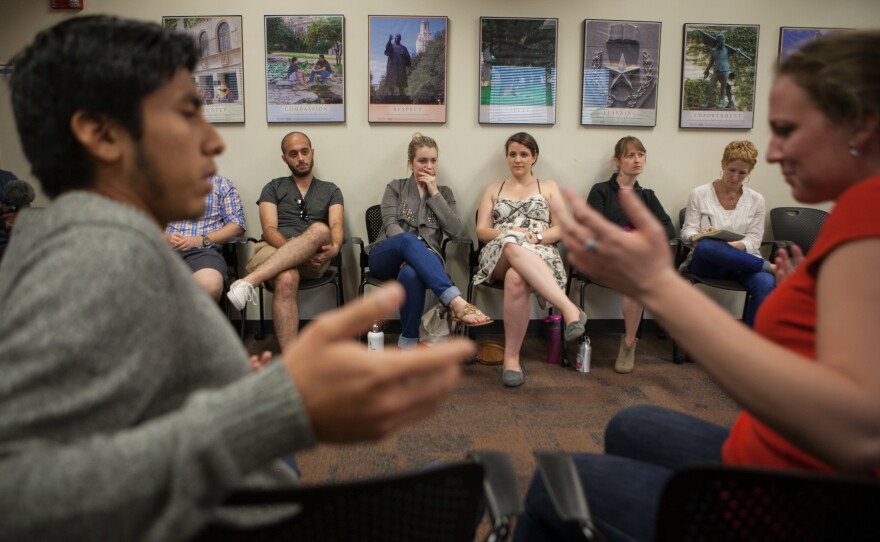Three actors are standing in a room in UT’s Counseling and Mental Health center, talking about sex.
It’s part of a performance called “Get Sexy, Get Consent," a series of skits put on by the Theatre for Dialogue program that are performed in front of everyone from freshmen at orientation to new athletes.
The program seeks to educate students on sexual assault in what's called the "red zone" – the peak reporting time between the first day of school and Thanksgiving, when reports of sexual assault reach their peak on many college campuses in the United States.
It's part of a larger effort by the University of Texas to prevent sexual assault amid national concern that many cases go unreported.
“You see how much dialogue starts to happen from the instant where they walk in and many students feel very shy and uncomfortable speaking until the end where you have much more student involvement,” says Jenny Arffmann, one of the actors.
Part of the recent focus on sexual assault means many colleges, including UT, are having blunt conversations about consent, what it means to give and have consent, and how students should establish consent.
“There’s a lot of nuance. There’s a lot of grey. And I think the challenging thing is you can consent to 400 things and the 401st thing, if you’re not consenting to that, it doesn’t negate everything that’s happened,” says UT’s Title IX Coordinator and Assistant Vice President for Student Affairs Jennifer Hammat. “But, as we educate our students, it can get confusing. ‘Well how wasn’t I supposed to know this one thing wasn’t okay?’”
Anytime you're talking about a culture change, it doesn't happen overnight. - Jane Bost
Title IX refers to a federal law that bans gender discrimination at institutions receiving federal money. Sexual assault falls under that law because it can affect a victim’s ability to get an equitable education, and that’s considered discrimination.
“Five years ago, people thought Title IX only had to do with sports,” Hammat says, adding that she believes the recent focus on sexual assault doesn’t imply schools were ignoring the issue before.
“Colleges felt like legislators were saying we’ve been doing nothing. That we’ve been sitting back, watching rapes happen and being like, ‘Ah, that’s bad,’ and done nothing and that’s not true,” she says. “I think everyone has been trying to do something. The challenge is this is one of those things people don’t talk about. And now we’re talking about it.”
Recently, California passed a law that requires students give affirmative, conscious and voluntary consent before sex – a so-called “yes means yes” law. Hammat says UT will be watching how that legislation works.
In the meantime, the university is continuing its prevention efforts through Voices Against Violence. It’s been a part of UT’s Counseling and Mental Health Services for the past 13 years. President Obama’s task force aimed at sexual violence even highlighted the group as a model for other schools. Jane Bost works in Counseling and Mental Health Services at UT. She also helped start Voices Against Violence.
“This is all primary prevention,” Bost says. “We’re really looking at fundamentals that underlie sexual assault or relationship violence.”
That primary prevention includes presentations about dating and sexual violence, and stalking. Officials say in the age of social media, stalking has become a more prevalent issue. The program also teaches students how to react when they see inappropriate behavior.
“So if people have a good understanding and they endorse and implement healthy relationships, understand consent, if they are looking out for each other,” Bost says. “We’re talking about creating a foundational change for culture change at UT.”
When freshmen get to UT, they have to watch a seven-minute video that shows them where to go and what to do if they are assaulted, UT-Austin Police also offer a 12-hour self-defense course.
Hammat in the Title IX Office says the university can make sure students hear at least something about consent, prevention or reporting an assault.

“It’s a series of shotgun blasts that we’re trying to make sure that everyone has heard something about it,” she says. “And if something comes up that they know whom to call, because everyone can’t be up to speed on every part of nuance of the issue.”
But, for many students, sex and dating haven’t been discussed extensively before they arrive at college, and that makes talking about consent even more difficult. Briana Bower is a graduate student and another actor in the” Get Sexy, Get Consent” performance.
“In Texas there is a trend toward abstinence-only sex education and a lot of students coming in A) not knowing how to talk about sex at all and B) because they’re not talking about sex and they haven’t practiced, they’re not talking about consent,” Bower says. “They don’t know how to negotiate that.”
Hammat in the Title IX office agrees, saying that many Texas public schools don’t talk about sex because they don’t teach sex education.
“As smart as all of our students are, this has been an area where there hasn’t been a lot of dialogue,” says Bost, adding that even defining consent among students is a big step. “Anytime you’re talking culture change it doesn’t happen overnight. But things we’re doing through [Voices Against Violence] overtime, more and more people have heard of us. I feel optimistic knowing we have a long ways to go.”
UT’s annual security report is scheduled to be released tomorrow, and
it’s expected to show a big increase in the number of reported sexual assaults on campus. We’ll take a closer look at what’s behind those numbers tomorrow.





